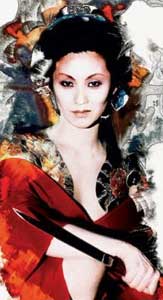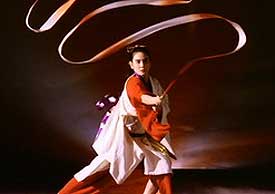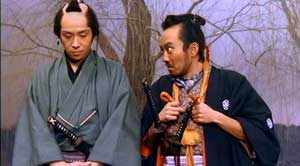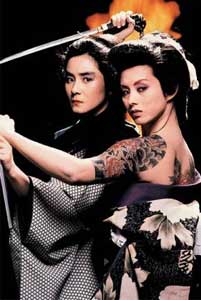 Three men sentenced to death for sundry crimes discover that other men have been beheaded in their place. They now no longer exist, & will be killed if they do not serve well as shogunate "shadow police."
Three men sentenced to death for sundry crimes discover that other men have been beheaded in their place. They now no longer exist, & will be killed if they do not serve well as shogunate "shadow police."
To insure they never speak of their secret triad of "dead" shadow-police, each man has his voicebox punctured. They are then armed with a sword-truncheon, a weapon that combines the shortsword with the jitte badge of a police officer.
Thus with cruelty & gloom begins Death Shadows (Jittemei, 1986), with the forceful induction & eternal silencing of the criminals Otomatsu, Yasuke, & Kapachi.
They spent their next twenty years under deep cover & servitude as extra-legal government assassins targetting criminal elements, permitted no lives of their own.
One of the three, Yasuke the Viper (Takuzo Kawatani), has a daughter in the yakuza underground, Ocho. She trained to be a killer with the unfilial plan to kill her father who abandoned her & her mom.
Her weapon of choice, a long pretty ribbon, is just about the most assinine thing any film ever pretended could cut & kill people. It's hard to think of a dumber weapon in chambara movies, but The Girl with Bamboo Leaves (Sasabe Omon, 1969) is about as bad.
Bushy-browed Ocho is played by Mariko Ishihara who was not a traditionally attractive young actress, & never became particularly successful as a movie star. Still, when you get used to her odd looks, she has a definite appeal in this role. She might've made an exceptional sword-heroine if the story hadn't made her look so damned foolish twirling ribbons at her foes.
 Death Shadows is one of Gosha's worst films. First problem is the campy & moronic for fighting tecniques which have gotten it compared to the cartoonier sorts of Shaw Brothers kung fu films, rather than to vastly classier samurai films.
Death Shadows is one of Gosha's worst films. First problem is the campy & moronic for fighting tecniques which have gotten it compared to the cartoonier sorts of Shaw Brothers kung fu films, rather than to vastly classier samurai films.
Worse, the shadow police though mutes have no trouble communicating. They speak by means of elaborate hoky-looking sign language, & when the plot requires individuals who've never seen this method of communication to understand it anyway, they just do.
And third, the plot becomes increasingly confused as it goes along. It almost looks like the original intent was to tell three interwoven stories, one each for the three death-shadow police introduced in the opening scene, perhaps in a two-film set but at the last minute Gosha was forced to turn it into one film. So he only get round to telling one & a half stories.
Yasuke the Viper wants to quit the shadow-police, but death is the only way out. He tries to make amends with his daughter Ocho, but she won't forgive him until after he dies saving her life.
As a murderess, Ocho the Flower Storm is to be crucified to death, but she's secretly replaced with a look-alike & forced to become a shadow-cop, to replace her dead father, charged with assassinating criminals who're too well placed for the law to openly arrest.
By rights Ocho should've been "silenced" with a sword thrust to the voicebox, but she rebels against that notion & gets away with it. The story essentially comes to a full stop with the "climax" of her father's sacrifice, & Ocho's character moves to the background for a while, as a second story is begun.
Practically starting the film over again, we're introduced to a merchant whose wife gave away some old clothes for charity. She accidentially gave away a special over-obi with an important paper rolled up inside it, a document that could bring down a samurai clan, for the "merchant" is really a samurai living an "undercover" life in service of his clan.
His attempt to get the over-obi back results in murder. The script is so sloppy in the manner of the telling it has no suspense at all. But momentarily we're introduced to the film's biggest saving grace:
A second tough woman enters the tale. She's a dart-tossing tattooed harlot, Oren the Thistle (Mari Natsuki). She's rotten to the core, but even so the most appealing character. She periodically performs a jazz-dance to colored strobe-lights, to make sure that the film's silliness is highlighted, this being in counterpoint to Ocho's periodic dance with her twirly ribbons.
Officer Jigoku ("Hell") gets the over-obi & won't part with it. As he fights to keep it, he makes sounds like the Three Stooges, totally absurd. He's massively curious about the secret meaning of the over-obi. And Ocho the ribbon-fighter lurks about doing nothing beyond reminding us we are indeed still watching the same movie we started with.
 There are not many effective moments in the film, but I was impressed by a sequence in which Oren the Thistle begs clan assassins for her life. She's despicable, pathetic, & has a hideous smile & red eyebrows, a real monster as she bargains for her life.
There are not many effective moments in the film, but I was impressed by a sequence in which Oren the Thistle begs clan assassins for her life. She's despicable, pathetic, & has a hideous smile & red eyebrows, a real monster as she bargains for her life.
Her would-be killers finally relent because she promises to help them get the document they are after. She well knows that as soon as they have what they want, they'll killer her anyway, so she must be always on guard.
As a criminal with an underworld reputation, Oren dreams of becoming a "lady boss" among yakuza. When at last she fights for her position, she turns out to be a better swordswoman than Hamada Clan samurai.
Despite her deep villainy, she's certainly cool, & the film has no heroic figures in the nominal sense, so in a twisted way Oren compared to most of these characters is rather noble. Almost everything about her is dishonest & manipulating & trusting her for anything at any time is a bad idea. And yet Denzo (Takeo Chii), a slain yakuza, had been her only honestly beloved partner, & for his sake she takes a horrible revenge against the proud Hamada Clan.
Genshiro, the Hamada Clan samurai living as a merchant, has been involved in smuggling, the very crime that could bring the clan down.
As the story progresses, Genshiro becomes almost demon-like in his selfless stupid faithfulness to his clan. And Ocho the ribbon-fighter rather loved him for his insane dutifulness, serving his clan one way or another even after they toss him out like an unwanted dog.
The stories of caterpillar-browed Ocho & red-browed Oren are poorly integrated. Posters & dvd boxes had implied that Oren & Ocho unite for some purpose, but in the film they never do so. Their individual plot threads could easily be re-edited into two separate short films.
Eventually rebellious Ocho realizes that all the tragedies & unhappinesses of her life were the fault of the guy who created & heads up the shadow-cop project for the shogunate.
Her final duel, ribbon vs sword, is with the samurai who runs the secret organization. Though the film started out in mediocrity, & developed some of the worst absurdities of any samurai film , once one adjusts to the absurdities, it eventually boils down to a rather successful action climax.
So it ends well, & the closing theme song "Against the Wind" is quite nice as well. It remains one of Gosha's weakest films, & he's capable of so much better that one wonders if he had a rather different film in mind, but met with harmful studio interference.
copyright © by Paghat the Ratgirl
|

